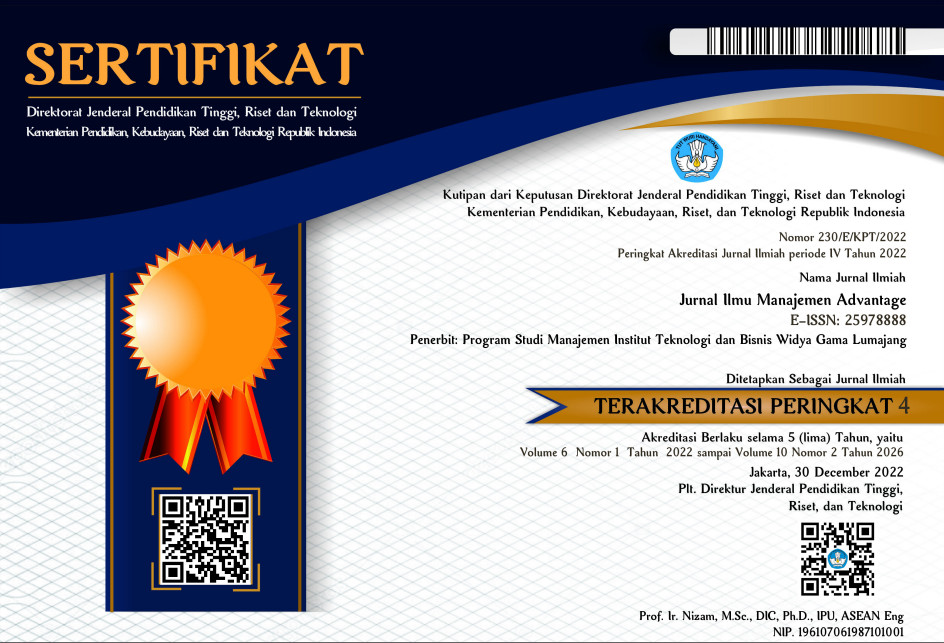The Role of Soft Skills in Supporting Journalist Performance in Disaster Prone Area
DOI:
https://doi.org/10.30741/adv.v6i2.928Keywords:
Soft Skills, Performance, Disaster Prone Areas.Abstract
This study aims to determine conceptually-theoretically the soft skills and performance of individuals who pursue certain professions, especially journalists who work in Disaster-Prone Areas. The method used in this study is the library research method, or it can also be called the literature review method, which is a type of study conducted by examining relevant related literature. Based on the results of data analysis, it can be concluded that soft skills are relatively closely related to performance even in situations and conditions that are not normal. An objective news presentation certainly requires special skills or abilities for journalists. Then there are some basic skills or abilities that journalists need to have. Some of these abilities that journalists need to have, namely writing properly and correctly, establishing communication with sources and skills in using information technology tools. It is not enough for journalists with assignment locations in Disaster Prone Areas to have basic skills. Need additional soft skills according to the situation and conditions. There is a fundamental difference between the duties of journalists in normal situations and conditions with disasters. Both in terms of sources and the accuracy of the information and news presented.
Downloads
References
Ali, H., Istianingsih Sastrodiharjo, & Saputra, F. (2022). Pengukuran Organizational Citizenship Behavior: Beban Kerja, Budaya Kerja dan Motivasi (Studi Literature Review). Grreenation, 1(1), 83-93. https://doi.org/10.38035/jim.v1i1
Bélanger, D., & Saracoglu, C. (2018). The governance of Syrian refugees in Turkey: The state-capital nexus and its discontents. Mediterranean Politics, 25(4), 413-432. https://doi.org/10.1080/13629395.2018.1549785
Budiningsih, I., Dinarjo, T., & Marlison. (2020). Hard Skill Versus Soft Skill Dalam Pencapaian Kinerja Karyawan Proyek Infrastruktur Mass Rapid Transit (MRT) Jakarta. Akademika, 9(2), 29-42. https://doi.org/10.34005/akademika. v9i02.895
El-Ibiary, R. (2020). Development Journalism, Gender Sensitivity and Sustainability in Egypt: Analyzing the Women’s Voices project. Kome, 8(2), 43-60. https://doi.org/10.17646/kome.75672.51
Habibullah, A. Z., Purnama, C., & Rezasyah, T. (2022). Public Diplomacy of Indonesian Film Agency through Film Industry as International Political Instruments. JWP (Jurnal Wacana Politik), 7(2), 187. https://doi.org/10.24198/jwp.v7i2.41447
Hiremath, S. S. L., Somashekar. (2022). ICT Based Best Practices In The Medical College Libraries. IP Indian Journal of Library Science and Information Technology, 6(2), 61-65. https://doi.org/10.18231/j.ijlsit.2021.014
Hopipah, N., & Setiawan, H. (2022). Analisis Framing Pemberitaan Jabar Siaga Satu Rawan Bencana Alam pada Media Online Detik.com dan Kompas.com. Tambusai, 6(1), 3940-3948.
Isnaini, A. Z., & Setiawan2, H. (2022). Framing Berita Bencana Alam di Daerah Istimewa Yogyakarta pada Media Daring Tempo.co dan Jogja.Tribunnews.com Sebagai Rekomendasi Teks Berita di SMP. edukatif, 4(1), 667-674. https://doi.org/10.31004/edukatif.v4i1.1919
Jambrešić Kirin, R. (2022). Treba čuti, vidjeti i dotaknuti. Etnološka tribina, 52(45), 3-80. https://doi.org/10.15378/1848-9540.2022.45.01
Jones-Jang, S. M., Mortensen, T., & Liu, J. (2019). Does Media Literacy Help Identification of Fake News? Information Literacy Helps, but Other Literacies Don’t. American Behavioral Scientist, 65(2), 371-388. https://doi.org/10.1177/0002764219869406
Kosterich, A. (2019). Managing news nerds: strategizing about institutional change in the news industry. Journal of Media Business Studies, 17(1), 51-68. https://doi.org/10.1080/16522354.2019.1639890
Madaíl, F. R. (2022). Supporting Narratives in News Stories Through Visualization U.PORTO.
Mujayana, M. (2020). Pengaruh Hardskill Dan Softskill Terhadap Kinerja Karyawan. Majalah Ekonomi, 25(2), 1-12. https://doi.org/10.36456/majeko.vol25.no2.a2930
Nugroho, S., & Sulistyorini, D. (2018). Komunikasi bencana: membedah relasi bnpb dengan media. Pusat Data, Informasi dan Hubungan Masyarakat, Badan Nasional Penanggulangan Bencana.
Nurjanah, Kuswanda, Siswanto, & Adikusumo. (2012). Manajemen Bencana. Bandung: Alfabeta.
Perreault, M. F., & Perreault, G. P. (2021). Journalists on COVID-19 Journalism: Communication Ecology of Pandemic Reporting. American Behavioral Scientist, 65(7), 976-991. https://doi.org/10.1177/0002764221992813
Putra, E. T., & Anita, N. (2021). Pengaruh Hard-Soft Skill Dan Disiplin Kerja Terhadap Kinerja Tenaga Pendidik Di SMK Negeri 1 Pasaman. KREATIF Jurnal Manajemen dan Bisnis Kreatif, 6(2), 1-15. https://doi.org/10.36805/manajemen.v6i2.1428
Rascão, J. (2021). ournalism and Responsibility Ethics and Social of Information Professionals ResearchGate.
Robles, M. M. (2012). Executive perceptions of the top 10 soft skills needed in today’s workplace. Business communication quarterly, 75(4), 453-465.
Salleh, R., Yusoff, M. A. M., Harun, H., & Memon, M. A. (2015). Gauging Industry’s Perspectives on Soft Skills of Graduate Architects: Importance vs Satisfaction. Global Business and Management Research: An International Journal, 7(2), 95-101.
Salzmann, A., Guribye, F., & Gynnild, A. (2021). Adopting a mojo mindset: Training newspaper reporters in mobile journalism. Journalism, 146488492199628. https://doi.org/10.1177/1464884921996284
Schell, C. J., Stanton, L. A., Young, J. K., Angeloni, L. M., Lambert, J. E., Breck, S. W., & Murray, M. H. (2021). The evolutionary consequences of human-wildlife conflict in cities. Evol Appl, 14(1), 178-197. https://doi.org/10.1111/eva.13131
Shu, K., Mahudeswaran, D., & Liu, H. (2018). FakeNewsTracker: a tool for fake news collection, detection, and visualization. Computational and Mathematical Organization Theory, 25(1), 60-71. https://doi.org/10.1007/s10588-018-09280-3
Simanjuntak, R. M., Simare-mare, A., & Wau, Y. (2020). Implementasi Supervisi Klinis Berbasis Soft Skill Dalam Peningkatan Kinerja Guru. Prosiding Seminar Nasional Hasil Pengabdian Masyarakat: Kontribusi Perguruan Tinggi Dalam Pemberdayaan Masyarakat Di Masa Pandemi., 187-193.
Soreide, K., Hallet, J., Matthews, J. B., Schnitzbauer, A. A., Line, P. D., Lai, P. B. S., . . . Lorenzon, L. (2020). Immediate and long-term impact of the COVID-19 pandemic on delivery of surgical services. Br J Surg, 107(10), 1250-1261. https://doi.org/10.1002/bjs.11670
Stasielowicz, L. (2022). Adaptive performance in refugees after trauma: how relevant are post-traumatic stress and post-traumatic growth? International Journal of Workplace Health Management, 15(6), 711-727. https://doi.org/10.1108/IJWHM-12-2021-0230
Tajriani1, D. T. (2019). Pengaruh Soft Skill Dan Dukungan Sosial Teman Kerja Terhadap Kinerja Pemasaran BMT Di Yogyakarta. Indonesian Interdisciplinary Journal of Sharia Economics (IIJSE), 1(2), 1-6.
Tejedor, S., Cervi, L., Pérez-Escoda, A., & Tusa, F. (2022). Smartphone Usage Among Students During Covid-19 Pandemic in Spain, Italy And Ecuador ResearchGate, 1-3. https://doi.org/10.1145/3434780.3436587
Wardani, N. A., Ritonga, I. M., & Putra, R. (2022). Pengaruh Kompetensi, Budaya Organisasi, Soft Skill Dan Pengembangan Karir Terhadap Kinerja Pegawai Di PT. Bank Sumut Pusat Medan. JEBIDI (Jurnal Ekonomi Bisnis Digital), 1(2), 226-240.
Downloads
Published
How to Cite
Issue
Section
License
Copyright (c) 2023 Zainul Hidayat, Yessy Anggraeni, Mokhamad Taufik

This work is licensed under a Creative Commons Attribution-NonCommercial 4.0 International License.










